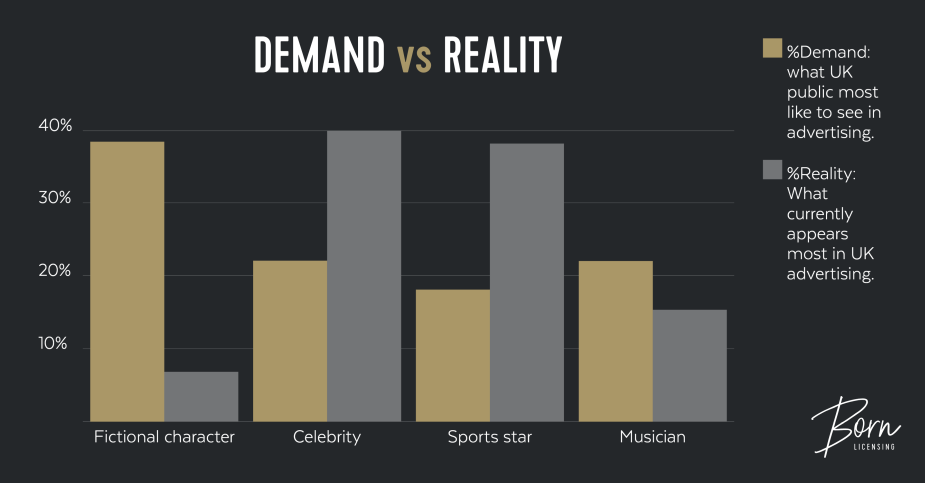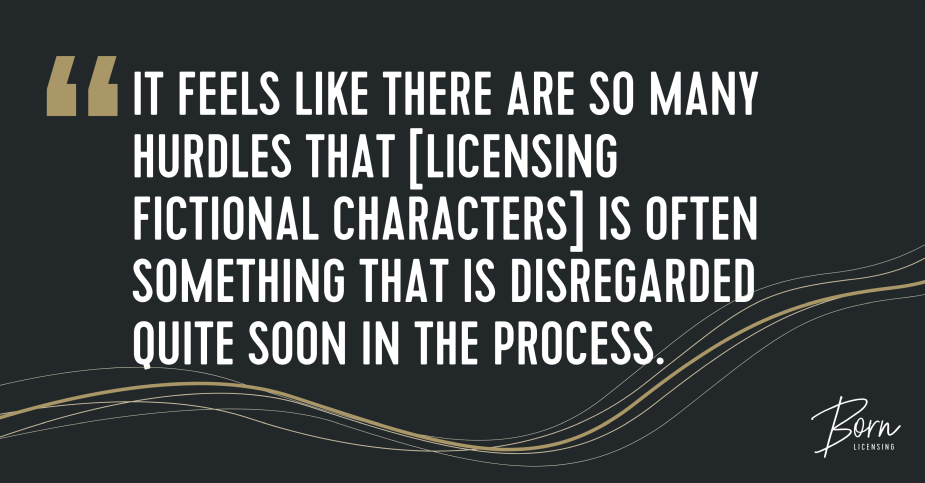
How Fictional Characters Can be Better Utilised in Advertising

This week Born Licensing released a groundbreaking new white paper which highlighted how fictional characters are under-utilised in advertising.
Those who haven’t had the chance to read it can access here.
The report covers a range of topics relating to the use of fictional characters in advertising and often uses celebrities, sports stars and musicians as a benchmark.
Through Ipsos MORI research, we were able to determine that more of the UK public ‘most like’ to see fictional characters in advertising compared to celebrities, sports stars and musicians.
After reviewing over 4,000 UK advertisements from 2018-2020, we were also able to determine that fictional characters appear in just 1.1% of advertisements. This is significantly less than celebrities (6.2%), sports stars (5.9%) and musicians (2.4%).
Collectively, all of these groups featured in a total of 626 UK adverts from 2018-2020. Fictional characters featured in just 7% of those.
In the graph below, we compare what the UK public indicated they ‘most like’ to see in advertising to how often they actually appear. As you can see, the demand for fictional characters is significantly higher than what currently appears in UK advertising.

Above: Ipsos MORI survey 27 November 2020 n=999 adults aged 16-75 in the UK who selected either a fictional character from a film, TV show or animation, a celebrity, a famous music artist or a famous sports star.
If the demand is there, why are fictional characters not being utilised in advertising as much as they could be?
We asked this exact question while preparing our white paper. Through research and surveys, we managed to get to the bottom of it.
6 in 10 Producers said they have worked on a project that involved film, TV or animation IP that didn’t go ahead. While this is a smaller portion than creatives (they were 100%!), it still demonstrates that even if a script with a character manages to overcome the challenges faced by creatives, the majority still don’t make it to production.
With that in mind, here I will list 5 things that Producers should be doing in order to give scripts featuring fictional characters the very best shot at being produced.
1. Encourage creatives to be flexible with the characters
Through our research we discovered that creatives were more likely to develop a celebrity led campaign with a certain type of celebrity in mind but gave creative flexibility for other similar celebrities to substitute if the first choice was not feasible. However, when writing fictional characters into scripts we learnt that creatives are more likely to lock the creative into that one character with little opportunity to switch to an alternative if that character couldn’t be licensed. At Born Licensing we encourage all of the agencies we work with to have a backup character, in mind and a backup for the backup, to ensure the script has the very best chance at moving forward.
2. Understand (and prepare for) the potential licensing costs as early on as possible
We surveyed both Creatives and Producers, and both groups identified licensing costs as the biggest reason why scripts with fictional characters hadn’t been produced in the past. There are a number of benefits when determining even ballpark licensing fees at an early stage. It allows those fees to be worked into a production budget at a time when less budget has been committed. It also allows for time to potentially ask the Client for an increased budget to accommodate the licensing fees. Perhaps most importantly, it can be quite an early indication of having to move to an alternative and possibly less expensive fictional character.
3. Ensure all stakeholders are aware of the benefits of working with fictional characters
Fictional characters are incredibly powerful. They bring with them an established fanbase, broad awareness and existing memory structures. Rights Holders typically have fact sheets and compelling statistics about their characters that can be shared to help work through any doubts or people having second thoughts about the creative approach.
From a production standpoint, working with fictional characters on set compared to celebrities, sports stars and musicians is often considered easier. There are no egos to manage or sensitivities to consider. Fictional characters can also be less of a risk to work with, something which we discuss a lot in the white paper. Although it’s obvious, we like to point out that fictional characters will never create a scandal by getting caught driving under the influence, cheating on their partner or using a competing product or service. This offers the campaign a lot of protection from scandals and other unexpected PR disasters that could arise.
4. Use your time wisely
A portion of those we surveyed indicated that tight timing was a reason why a project like this was abandoned. Sometimes it can take weeks (or longer) to get in touch with the appropriate Rights Holder to discuss using their character. Unless you’re working with a licensing expert who can do this much quicker (see point 5.) factoring in timing is critically important. Even if you connect with the right person at the Rights Holder, it’s extremely unlikely you will get feedback straight away, as they’ll need time to review and share with other key stakeholders. This applies not only to the initial scoping stage, but the entire licensing process. Allow as much time as possible to the approval / brand assurance processes and the contract process. Some things may take longer than expected, such as getting a press release approved which sometimes gets forgotten about, but often takes the longest amount of time due to the amount of stakeholders that need to review.
5. Work with a licensing expert

Above: A creative director on the challenges faced when licensing characters.
Of the producers we surveyed, only 2% said that they didn’t see value in using a third party to broker licensing fees. This indicates that the vast majority of producers feel that they don’t have the knowledge, relationships, bandwidth and/or resources to managing the licensing of characters on their own. The quote above is from a creative director we interviewed, and something we felt is shared quite commonly across the industry.
Licensing characters for advertising is such a niche area that even most of the licensing industry don’t understand the process involved. It is quite different to licensing music or working with talent. Having an expert onboard early to help navigate the hurdles that are certain to come up (as they always do!) is key unlocking the best chance at nailing the licensing process. They are the ones that can advise very early on how likely it is going to be to secure the desired character, along with providing a number of backups. One thing it does have in common with music and talent is that relationships are key. Knowing the right people to go to at each Rights Holder makes the process of exploring use of characters much quicker and easier. A licensing expert also plays a vital role in the brand assurance and approval process, as their involvement streamlines this and makes the production process smoother. Having a licensing expert onboard at the very early stages of campaign development will allow someone with great experience to work through all of the challenges the Creatives and Producers we surveyed indicated had led to their scripts being abandoned.
The team at Born Licensing hope that our guidance on this topic will result in more brands and creative agencies experiencing the many benefits attached to working with fictional characters.













